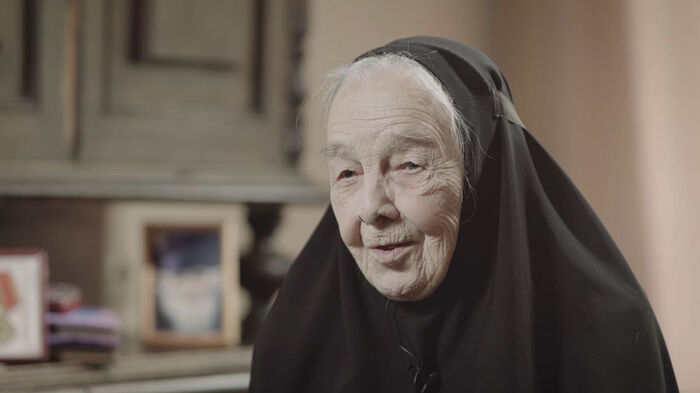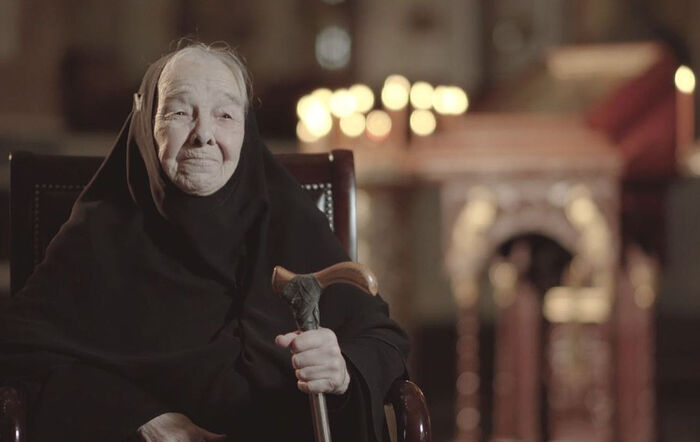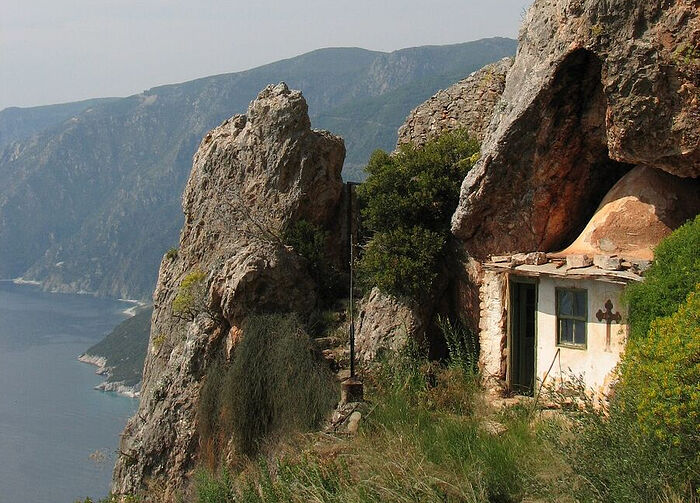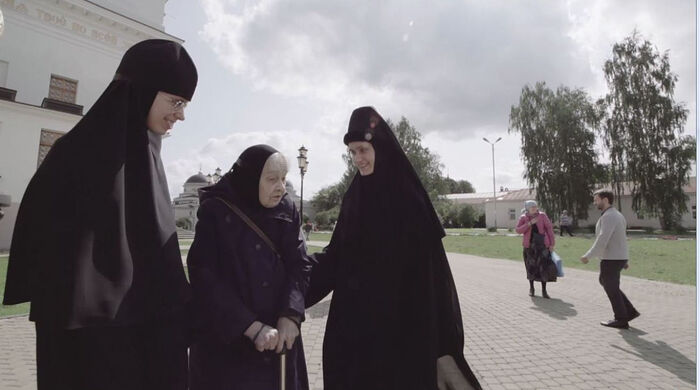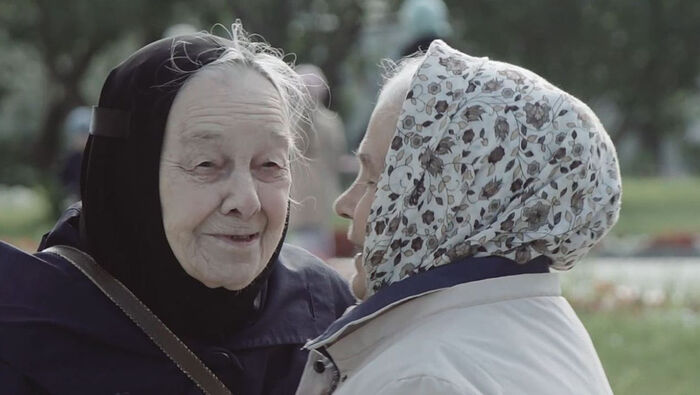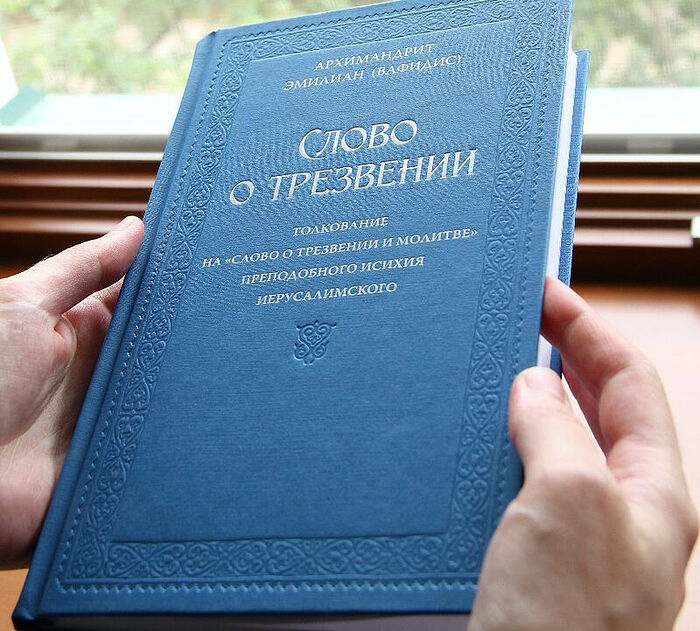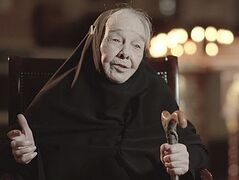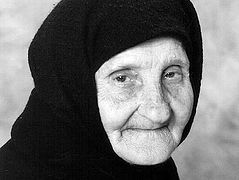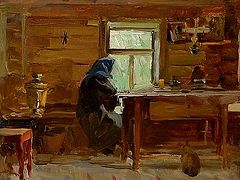Forty days ago, Schemanun Ekaterina (Dudina), the oldest nun of St. Alexander Nevsky Novo-Tikhvin Convent in the city of Ekaterinburg who was the same age of St. Paisios of Mt. Athos, fell asleep in the Lord. Both monastics and lay-people can learn many valuable and inspirational lessons from her life, which boil down to the following words: “How can you stay young until you are about 100 and pass into eternity in the same state?”
It is never too late for a fresh start in life
Schemanun Ekaterina (secular name: Galina Leonidovna Dudina) converted to the faith when she was over sixty. She became wholeheartedly devoted to her faith and made a fresh start in her life—in the Church. She inspired her two daughters to choose the monastic path. Some fifteen years after her daughters had joined convents her husband died, and Galina remained absolutely alone at the age of eighty-four. It would seem that you couldn’t expect anything else from life in such a situation and would live out your days in front of TV, or occasionally in the company of other elderly people. But Galina didn’t think so—her life entered a new (and wonderful) phase.
Galina threw out her TV set because she felt bored with it. Sometimes she would listen to an Orthodox radio station, but her favorite occupation was reading. True life flowed from patristic books, and Galina would quench her spiritual thirst like a tree growing beside a stream. She didn’t image her life without church, so on Saturdays, Sundays and major feast-days she would always pray at the convent’s St. Alexander Nevsky Cathedral. Children, young and middle-aged people and her peers would always stand beside her at church; this woman radiated good vibes and a lot of joy.
Galina herself was always happy to see anyone who happened to be near her. Even casual attenders at church sensed her kind and affectionate nature immediately. The nuns recall how one day a group of foreign tourists came into the church and saw Galina walking towards them. She was seemingly a typical Russian old lady in a headscarf and with a stick. Suddenly she stopped, smiled with a serene smile and said some kind words to them in perfect English! She used to teach English at a school for many years and now she decided to take the opportunity and greet the guests in a polite manner. The tourists opened their mouths in amazement and hurried to take pictures of a remarkable grandma…
Galina never felt lonely at home; her beloved saints, her guardian angel and the Lord were with her. Once her father-confessor gave her a cat to brighten up her loneliness.
“It saw that I was an old woman and it was free to do whatever it pleased,” Mother Ekaterina related. “No sooner had I turned away from it than it jumped on the cabinet and then on the chandelier. So I had a lot of trouble with it. I called the priest and said, ‘Father, please take back the cat you gave me. I am not bored alone at home.’”
Galina’s life resembled that of a nun. At night she would rise to pray, and during the day she would read the Gospel, writings of the Holy Fathers and the Psalter. And it was quite natural that she eventually chose to be tonsured a nun. At the age of ninety-five she again started a new chapter in her life. With the blessing of her father-confessor, Mother Ekaterina continued to live at home, in the world, but her life became different. She grew spiritually and even ceased to listen to the radio. She would say:
“I don’t know why, but reading and praying is all I want to do.”
She began to understand spiritual books more deeply and sometimes, like a true eldress, explained to her Orthodox friends the things they couldn’t understand.
“I was on Mt. Athos!”
Mother Ekaterina spent the final days of her life at the convent. The sisters recall how easily and promptly she accepted their invitation: “I will surely come! With pleasure!” She took a book, her spectacles and medicine and got in the convent’s car, leaving the apartment she had lived in for over fifty years with perfect calm.
On arriving at the convent she sat down on the bed of her cell.
“Do you like here?”
“Oh wait, wait…”
Mother Ekaterina was sitting with her eyes closed and with her hand on her bosom. The sisters thought she was trying to catch her breath after the journey. And she repeated:
“Oh wait, wait… I must realize that I am in Paradise!”
Such was her outlook on life: she saw Paradise everywhere! The nuns were amazed. How young and fresh her soul must have been! Anyone who has had to leave his old beloved home in old age knows what this means.
While examining the cell, Mother Ekaterina saw a photo of the kaliva of St. Joseph the Hesychast on the wall. Her eyes lit up with joy:
“Though I have never been to Mt. Athos, I still can say that I was there! One day our priest recounted on the radio how he had travelled to Holy Mount Athos! Oh, that was awesome! I just followed him on all the tracks and to all the sketes! Then I told him: ‘Father, I have visited Mt. Athos!’ He was wide-eyed with astonishment: ‘Well, I never! That’s impossible!’ I said: ‘Possible! Together with you! Thank you for that!’”
This is lesson 1 from Schemanun Ekaterina: In every thing give thanks (1 Thess. 5:18).
“As long as we’re alive we aren’t dead”
At the convent Mother Ekaterina inspired all the sisters, remaining as cheerful, kind and pure as ever. Her presence was already a consolation for everybody.
She looked at everything around her with a keen interest just as little children do. She responded to everything with animation and emotion:
“Now we have moved from one building to another,” the sister who carried her to church in a wheelchair said.
“Oh, it was a round-the-world trip!” Mother Ekaterina replied.
“Mother Ekaterina, I’ve brought you some porridge,” another sister said.
“Porridge is excellent!”
“How are you feeling?”
“Better than everyone!”
And all this was done so simply and sincerely—from the bottom of her heart.
Getting out of bed was difficult for Mother Ekaterina because by age ninety-six she had multiple serious diseases. However, she never complained or asked for help. Whenever she was offered assistance, she replied: “No thanks. I must do the things that I can do by myself.” And the schemanun would command herself cheerfully:
“So, rise quickly!” she would say to herself, leaning on her hand. “Come on now! Do it, my dear hand, do it! Well done! Sit upright, sit straight or you’ll lie down again! You’re sitting well now, well done!”
This is lesson 2: Rejoice evermore (1 Thess. 5:16).
***
Whenever the sisters were assigned to do something for Mother Ekaterina, they literally ran to her. They were happy to look at her (always peaceful, always shining with joy) and listen to her short instructions. She spoke simply, as if for herself, but her words turned out to be a lesson and revelation to the sisters.
“I’ve just understood the meaning of the saying, ‘As long as we’re alive we aren’t dead.’” She shared her insights with one sister. “If our souls are alive in this life, then we will stay alive after death—we will enter Paradise. In truth, we should live with our souls, with our souls!”
Later the parishioners of the convent’s church related to the nuns that Mother Ekaterina had told them the same thing: “We should live with our souls! And not this way when you wake up in the morning and your mind is already preoccupied with daily chores: how to take your kids to school, go to work, buy some food, and so on… Instead, on waking up think of your soul; thank the Lord that you are still alive; ask for His help; and your whole day will be transformed.”
This is lesson 3: “The soul’s happiness is in God” (Blessed Augustine of Hippo)
***
Schemanun Ekaterina learned this lesson to perfection: she lived with her soul every moment of her life, with as much strength as a human being can summon. Every morning after waking up she would say: “Glory to God, I’m awake! Birds are singing, therefore I am alive! Rejoice, my guardian angel!” She would often recite prayers and psalms by heart; she especially liked St. John of Kronstadt’s thanksgiving prayer.
Whenever she spoke, it always was about saints or the Church. She remembered the Lives of many saints down to the smallest details just as we remember the dates and events from the lives of our nearest and dearest. One night a sister was strolling around the convent’s courtyard with a book on Elder Silouan in her hands. She decided to call on Mother Ekaterina and inquire about her health. It turned out that Nun Ekaterina was awake: she was sitting on her bed with a prayer rope in her hands. Having greeted each other, both sisters talked about St. Silouan of Mt. Athos till half past three in the morning when the bell announced the beginning of Matins.
Another sister sang the troparion of the feast of the Holy Trinity to Nun Ekaterina and apologized:
“I’m sorry if I don’t sing beautifully.”
“You shouldn’t say that! Everything is beautiful in the Church!”
On that day Mother Ekaterina was rather unwell and her speech was indistinct due to weakness. She said with a smile:
“I feel as if I were full of sweet wine.”
The sister replied:
“Are you thinking of the apostles? They were mocked on that day. People said, These men are full of new wine (Acts 2:13).”
“Of course, I am thinking of them. After all, today is Pentecost, the feast of the Holy Trinity! Who else should I think of, if not the apostles?”
She lived in the Church with her soul, thoughts and heart. She would recount:
“When I was young—between seventy and eighty years old—my friends and I would attend all the church services, including Great Compline and the Liturgy of the Presanctified Gifts during Lent and every Vespers and Divine Liturgy during the rest of the liturgical year.”
When she came up to icons at church, she would greet the saints as her good friends: “My darling, Father Seraphim! My beloved Mother Macrina!” The celestial world was as close and real to her as is this physical realm to us.
This is lesson four from Schemanun Ekaterina: “The source of true joy flows in church” (St. John of Kronstadt)
A battle for watchfulness
“There are words, ‘the ever-open Hearing’ in the prayer of St. John of Kronstadt,” Nun Ekaterina said to a sister. “First I didn’t understand their meaning, but now I understand: the Lord hears every word, every thought of mine.”
And that was not just a theory for her. Despite her sociable disposition Nun Ekaterina tried her best to control her words. For example, she told the sister who would take her for walks about her sore knees to explain how she could go up and down the steps. Then she wanted to add something about her health but suddenly stopped: “No, I shouldn’t talk about this!” She avoided speaking about health (a favorite topic of conversation among many elderly and not only elderly people) and you had to “interrogate her under torture” if you really wanted to find out whether she felt well or not. Those who are over forty understand that such remarkable reserve indicates a very high level of spiritual life.
She controlled not only her words but also her thoughts. The last book she read was on watchfulness, keeping one’s mind from wandering, inner stillness and prayer. It was the commentary by Archimandrite Aimilianos (Vafeidis) on a “Homily on Watchfulness and Prayer” by St. Hesychius of Jerusalem. When the sisters were going to give her this book they doubted if such a complex book would be comprehensible to a ninety-six-year-old nun. But she read it in one breath and shared her admiration with the sisters:
“He wrote about such lofty things in an understandable way, so everything is clear even to me!” She drew a concise and accurate conclusion from that book: “It seems like he wrote especially for me! Don’t scrutinize your thoughts, don’t analyze them—just pray! That is the main idea of this work!” And with the valor of a young soldier she began to put this into practice. Although during the final week of her life she almost never get out of her bed, she prayed with her prayer rope unceasingly. Despite this, she looked bright, cheerful and happy. She kept saying to the sisters:
“Do you think I’m just lying here?—I’m fighting! I’m having a spiritual battle!” and she would show her prayer robe. “What did Vafeidis teach? ‘Don’t pay attention to thoughts!’ It is clear who is the source of them. Eh, my mind is full of thoughts… But, once I see a thought trying to creep into my soul, I must strike it down with prayer!!!”
Even that was a revelation to the sisters. In most cases, whenever someone hears that he should chase away thoughts, he finds plenty of lame excuses: “Can it be possible? How can I stop thinking about this, or about that, or about such-and-such a thing? It can’t be helped because thoughts pop up in my mind despite my efforts to block them.” But Mother Ekaterina never asked such questions—war is war!
***
Three days before Mother Ekaterina’s repose a sister came to her in the evening to help her change her clothes. The schemanun lay without opening her eyes. The sister called her, and they had the following conversation:
“Sister Ekaterina! Sister Ekaterina!”
“I hear you, I hear your dear voice!”
“Are you all right?”
“Everything is well.”
“Are you praying?”
“Always praying.”
“Is prayer in your mind or in your heart?”
“In my heart. There’s nothing left in my mind.”
So we can interpret her words this way: Her spiritual “warfare” ended with the victory.
This is lesson 5: Pray without ceasing (1 Thess. 5:17).
Thy youth is renewed like the eagle's (Ps. 102:5)
On the Sunday of All Saints, Mother Ekaterina was at church and took Communion. When she was told the day before that she would be taken to the Liturgy, she shed tears of joy: “Oh, how wonderful!” Though she was very weak.
The next day she got worse. It turned out she had an extremely low blood pressure (fifty / thirty). While they were waiting for an ambulance, Mother Ekaterina was talking with the sisters, telling them stories and singing the song by Elder Nikolai Guryanov, “Grace-filled Home”, with them. The schemanun stopped every now and then, and one of the sisters (worrying for her) asked her:
“Sister Ekaterina, read the prayer to the Holy Spirit, please.” Mother Ekaterina would start reading obediently. “Can you read louder?” Gathering herself up, she would read louder. And, mustering up her strength again, she would continue talking with the sisters, reading prayers and singing…
When the doctors arrived, they couldn’t believe that her blood pressure was so low: “The pressure must have been measured incorrectly, otherwise the patient wouldn’t be so cheerful!”
After the preliminary examination the doctor was completing some forms. He asked Schemanun Ekaterina:
“What is your first name?”
“Ekaterina.”
“And your patronymic?”
Mother Ekaterina was deep in thought for a while and then replied:
“Ekaterina, the holy greatmartyr.”
It didn’t occur to her that she was asked to give her secular name and patronymic—she no longer belonged to this world. The sisters were prompting: “Leonidovna, Leonidovna!”
“Oh yes—Leonidovna!” Mother Ekaterina recollected.
Two doctors and a driver helped her get to the ambulance. Seeing them, she remarked with joy that they were like Ilia Muromets, Dobrynya Nikitich and Alesha Popovich [the names of famous ancient Russian bogatyrs—epic heroes.—Trans.], making them smile. One of the doctors even said:
“St. John Chrysostom was right to say that the most important thing is to maintain peace of mind in any circumstances.”
Mother Ekaterina, who was lying on a stretcher, livened up:
“Have you read St. John Chrysostom?”
“All twelve volumes.”
“Fine! If you recall, he also writes…”
Their interesting dialogue continued through the way to the ambulance. Mother Ekaterina and the doctor remembered Sts. Basil the Great, Gregory the Theologian, Nikolai of Ohrid and Zica, John of Kronstadt…
“Yes, saints are like our relatives! They are our kinsfolk!” the schemanun concluded.
Three days later her young soul departed to the Heavenly Fatherland and her beloved family of saints. Her soul flew away like a bird.
Her family and friends used to say that she had a happy disposition. But what does this happy disposition mean? Everybody can develop it if he wants—through gratitude, prayer and a heart that is open to the Word of God.
An eternal lesson:
Bless the Lord, O my soul! Blessed art Thou, O Lord! Bless the Lord, O my soul! And all that is within me, bless His holy name! Bless the Lord, O my soul! And forget not all His benefits! Who forgives all your iniquity, who heals all your diseases! The Lord is compassionate and merciful, long suffering and of great goodness! (Ps. 102:1-5).

